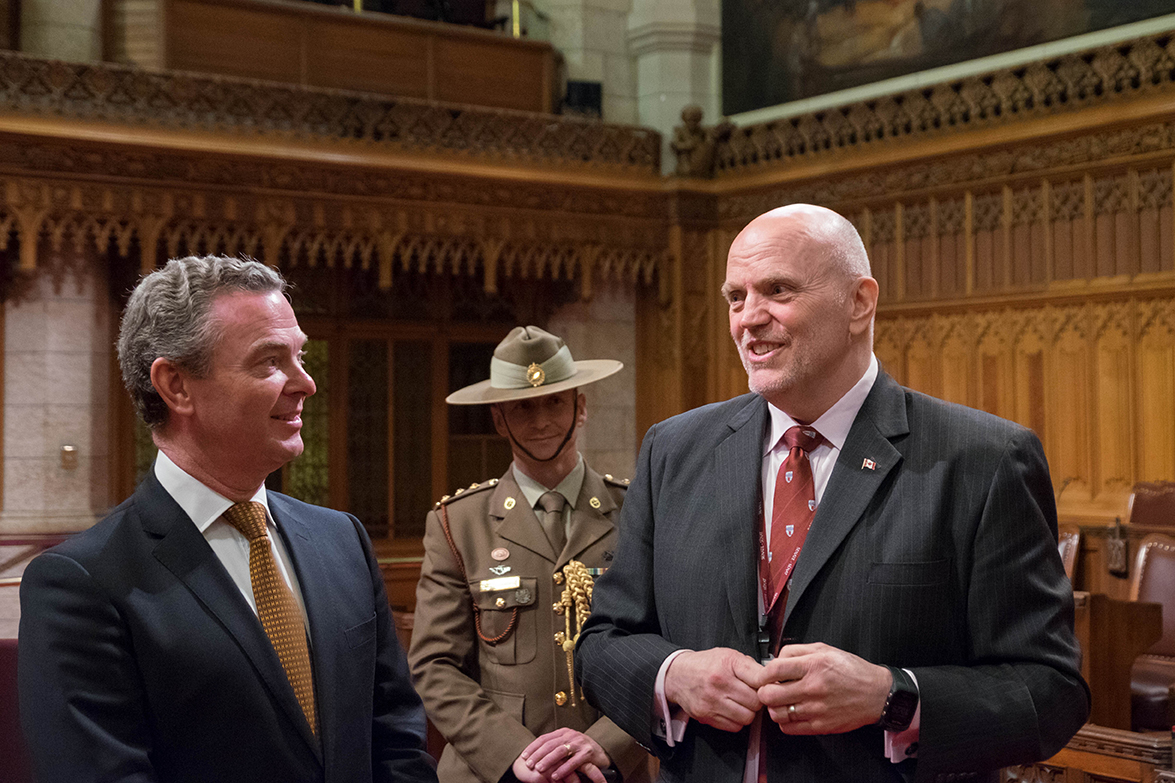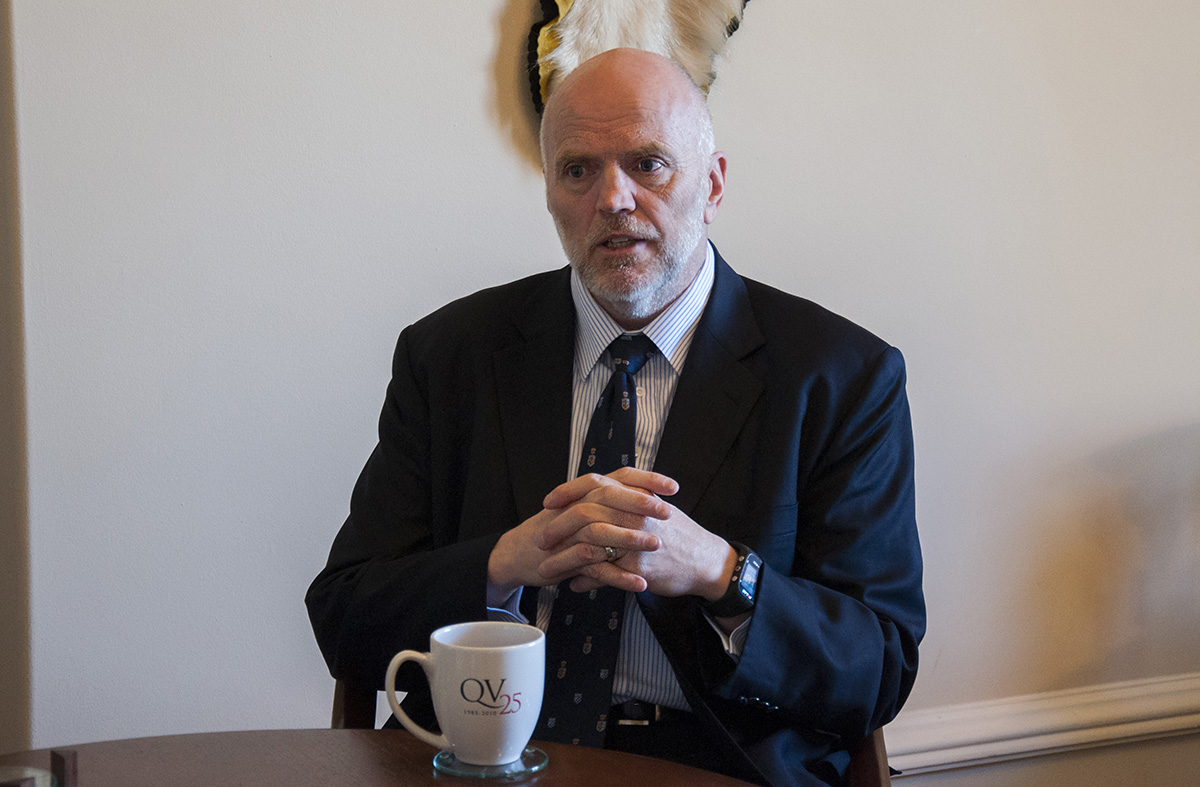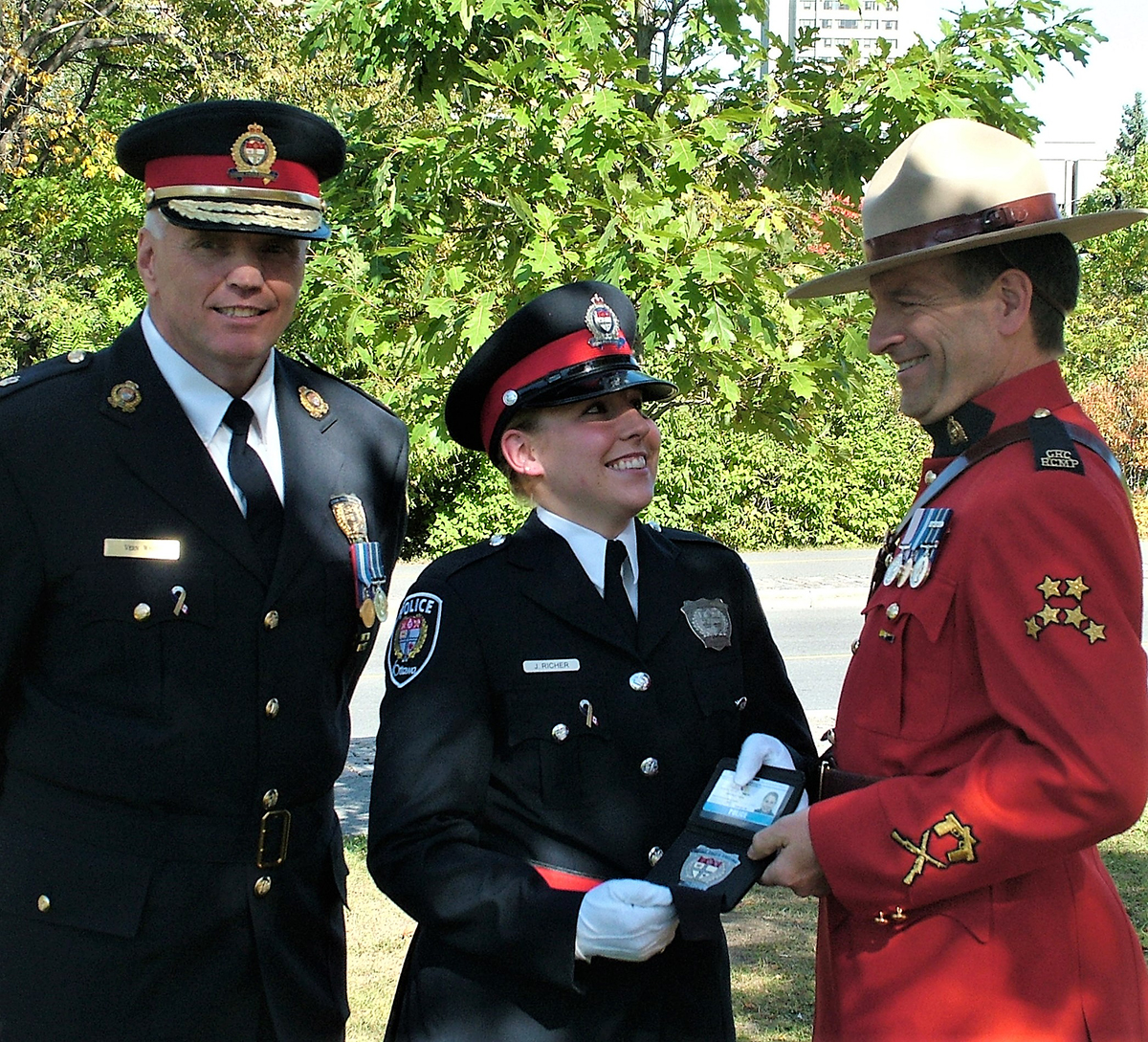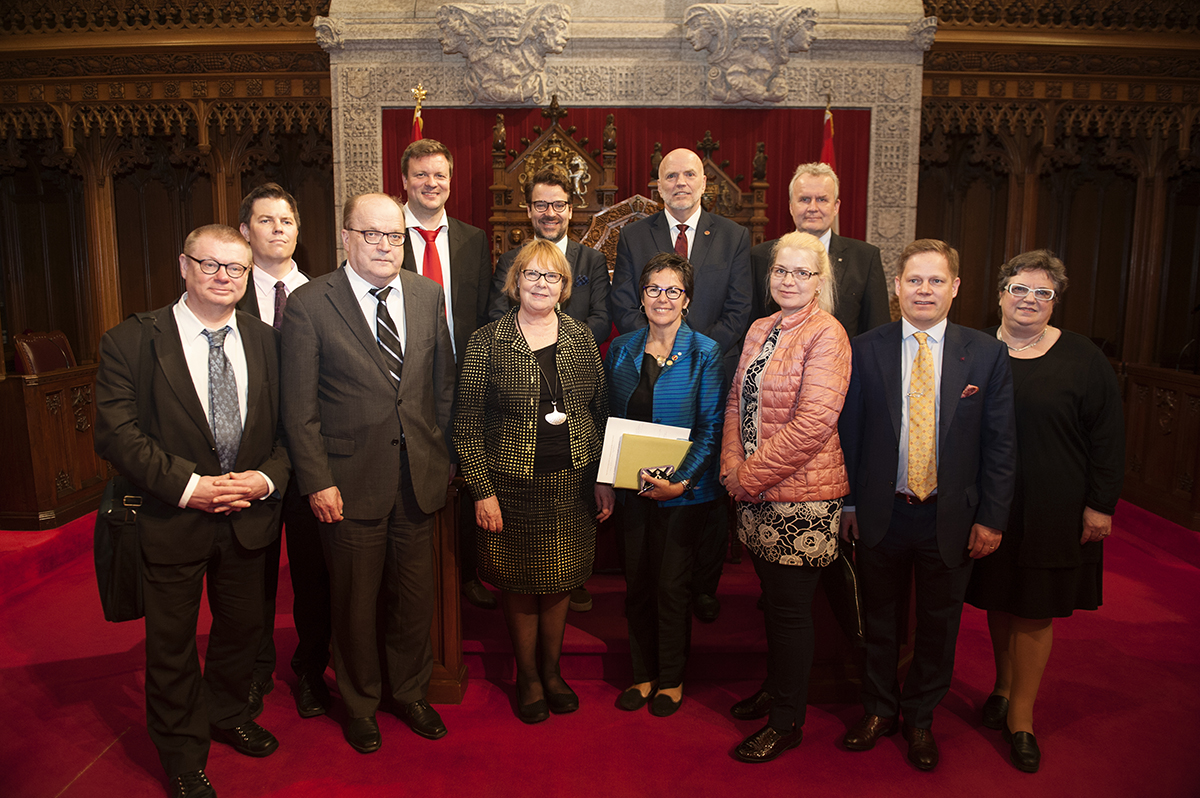Farewell from Finland: Senator Vernon White retires

Whether he was tackling the opioid crisis or national security issues, Senator Vernon White’s decades of policing experience informed his work in the Red Chamber.
Appointed to the Senate in 2012, the former Ottawa police chief sat on several committees during his 10-year tenure, including the Senate Committee on Legal and Constitutional Affairs and the Special Joint Committee on the Declaration of Emergency. He was also a member of the National Security and Intelligence Committee of Parliamentarians (NSICOP).
The senator for Ontario resigned his seat on October 2, 2022 and now lives in Finland with his wife and daughter. He caught up with SenCAplus to share his reflections on the Red Chamber and his post-Senate plans.
You decided to resign from the Senate before your scheduled retirement date of 2034. What led to that decision?
When I entered the Senate, I was clear — publicly and privately — that I would not serve until the maximum term date in 2034. So those who know me, knew this was an exit strategy. At the time, I had anticipated that I would serve in the Senate for six to nine years. The pandemic slightly delayed my retirement plan, but overall, this was my intention from the beginning.
Former prime minister Stephen Harper appointed you to the Senate when you were still Ottawa’s chief of police. What was it like getting that phone call?
It was surprising as I had never been previously involved in politics. I had only met the prime minister at a couple of events when I was the chief of police in Durham and Ottawa. My politics are unclear; I am a fiscal conservative but otherwise my views are all over the place.
At first, I thought the phone call was a prank because many of my friends would joke around. When I realized it was truly the prime minister, I needed to think about the Senate appointment. I had a job that I loved, and I was concerned about the effect politics would have on me, having had limited experience within a political arena.
What motivated you to join the Senate?
I hoped that I could make a difference at a higher level than police chief. I hadn’t applied for the position, so it was a different kind of motivation, but my decision to join the Senate was based on my hope that I could make a difference on a larger scale.
In 2017, you advocated for an amendment to Bill C-37 that called for staff at supervised injection sites to offer their patients pharmaceutical replacement drug therapy. Why was this amendment important to you?
I believe opioid addicts should have access to safe drug supplies instead of illegal street drugs, which are responsible for almost 21 deaths every day in Canada. Many have argued that we can win the war on drugs by combatting it from a supply perspective. To be fair, I may have agreed a couple of decades ago, but this approach has failed. We need to focus on addictions from the demand side, as well.
We need to engage addicts — particularly those struggling with opioid addiction — differently. Safe drug supplies could help save lives. I think the amendment that passed the Senate at that time would have obligated supervised consumption sites to offer alternative drug therapy, which would have been at the discretion of the medical facilitators.
I personally believe the Senate’s work on the issue was stellar. I was very disappointed that the House of Commons did not see that value and removed the amendment. I would argue that their response was short-sighted, especially now that we’ve seen the daily number of deaths due to accidental overdose rise from 11 to 21 per day during the pandemic.

Senator Vernon White, right, welcomes Christopher Pyne, Australia’s then-Minister for Defence, Industry & Leader of the House of Representatives in the Red Chamber in Centre Block in 2017.

Senator White, a police officer turned parliamentarian, in his office on Parliament Hill in 2020.

Senator White smiles with RCMP Staff Sgt. Marc Richer, whose daughter, Const. Julie Richer, was sworn into the Ottawa Police Service on September 9, 2009. Senator White was chief of the Ottawa Police Service from 2007 to 2012. (Photo credit: Office of Senator Vernon White)

Senator White (back row, second from right) poses with members of the Constitutional Law Committee from the Parliament of Finland in the Red Chamber in Centre Block in 2017. Also pictured is Senator Kim Pate (front row, middle).
You were also a member of NSICOP. How did national security evolve in the time you served as a senator?
The one guaranteed constant in national security is that it is constantly changing. World events are a large part of that, as the impact of the war between Russia and Ukraine has demonstrated. The ever-changing evolution of cyber security is something that all countries are focused on. It is certainly central to the national security of Canada.
You got to attend many Senate sittings on Parliament Hill before Centre Block closed for the rehabilitation project. Do you have any fond memories of your time in Centre Block?
This is an interesting question because before we moved to the Senate of Canada Building, I was convinced that the transition would have a negative impact on our work. This view was obviously not entrenched in reality; the temporary Senate space is a spectacular facility and organizers did a great job preparing us for the move. I always loved Centre Block for its history and I enjoyed working there.
What surprised you the most about the Senate?
Probably the level of work done by Senate committees. I had heard that the work in committee was at another level compared to the House of Commons. I think this is primarily because the Senate has more time and less distractions but also because senators are in it for the long haul; their terms last longer than 3.5 years. Even so, that was my biggest surprise.
What advice would you give to future senators?
I try not to give advice and instead let people find their own pathway, but I would suggest senators find their passion in the Senate. That’s what kept me going.
Apart from moving overseas with your family, what are your post-Senate plans?
I have obtained a role with a Finnish company, Secapp Oy, that focuses on safety and security, particularly in emergency communications. It fits with my previous employment and I think I can bring value to the company.
I will also continue working in the education field with the Australia Strategic Policy Institute. I recently wrote an article about the future of policing for Asia and the Pacific’s Policy Forum, so I hope to continue doing that work.
Learn more about Senator Vernon White in this SenCAplus article.
Related articles
Tags
Committee news
Farewell from Finland: Senator Vernon White retires

Whether he was tackling the opioid crisis or national security issues, Senator Vernon White’s decades of policing experience informed his work in the Red Chamber.
Appointed to the Senate in 2012, the former Ottawa police chief sat on several committees during his 10-year tenure, including the Senate Committee on Legal and Constitutional Affairs and the Special Joint Committee on the Declaration of Emergency. He was also a member of the National Security and Intelligence Committee of Parliamentarians (NSICOP).
The senator for Ontario resigned his seat on October 2, 2022 and now lives in Finland with his wife and daughter. He caught up with SenCAplus to share his reflections on the Red Chamber and his post-Senate plans.
You decided to resign from the Senate before your scheduled retirement date of 2034. What led to that decision?
When I entered the Senate, I was clear — publicly and privately — that I would not serve until the maximum term date in 2034. So those who know me, knew this was an exit strategy. At the time, I had anticipated that I would serve in the Senate for six to nine years. The pandemic slightly delayed my retirement plan, but overall, this was my intention from the beginning.
Former prime minister Stephen Harper appointed you to the Senate when you were still Ottawa’s chief of police. What was it like getting that phone call?
It was surprising as I had never been previously involved in politics. I had only met the prime minister at a couple of events when I was the chief of police in Durham and Ottawa. My politics are unclear; I am a fiscal conservative but otherwise my views are all over the place.
At first, I thought the phone call was a prank because many of my friends would joke around. When I realized it was truly the prime minister, I needed to think about the Senate appointment. I had a job that I loved, and I was concerned about the effect politics would have on me, having had limited experience within a political arena.
What motivated you to join the Senate?
I hoped that I could make a difference at a higher level than police chief. I hadn’t applied for the position, so it was a different kind of motivation, but my decision to join the Senate was based on my hope that I could make a difference on a larger scale.
In 2017, you advocated for an amendment to Bill C-37 that called for staff at supervised injection sites to offer their patients pharmaceutical replacement drug therapy. Why was this amendment important to you?
I believe opioid addicts should have access to safe drug supplies instead of illegal street drugs, which are responsible for almost 21 deaths every day in Canada. Many have argued that we can win the war on drugs by combatting it from a supply perspective. To be fair, I may have agreed a couple of decades ago, but this approach has failed. We need to focus on addictions from the demand side, as well.
We need to engage addicts — particularly those struggling with opioid addiction — differently. Safe drug supplies could help save lives. I think the amendment that passed the Senate at that time would have obligated supervised consumption sites to offer alternative drug therapy, which would have been at the discretion of the medical facilitators.
I personally believe the Senate’s work on the issue was stellar. I was very disappointed that the House of Commons did not see that value and removed the amendment. I would argue that their response was short-sighted, especially now that we’ve seen the daily number of deaths due to accidental overdose rise from 11 to 21 per day during the pandemic.

Senator Vernon White, right, welcomes Christopher Pyne, Australia’s then-Minister for Defence, Industry & Leader of the House of Representatives in the Red Chamber in Centre Block in 2017.

Senator White, a police officer turned parliamentarian, in his office on Parliament Hill in 2020.

Senator White smiles with RCMP Staff Sgt. Marc Richer, whose daughter, Const. Julie Richer, was sworn into the Ottawa Police Service on September 9, 2009. Senator White was chief of the Ottawa Police Service from 2007 to 2012. (Photo credit: Office of Senator Vernon White)

Senator White (back row, second from right) poses with members of the Constitutional Law Committee from the Parliament of Finland in the Red Chamber in Centre Block in 2017. Also pictured is Senator Kim Pate (front row, middle).
You were also a member of NSICOP. How did national security evolve in the time you served as a senator?
The one guaranteed constant in national security is that it is constantly changing. World events are a large part of that, as the impact of the war between Russia and Ukraine has demonstrated. The ever-changing evolution of cyber security is something that all countries are focused on. It is certainly central to the national security of Canada.
You got to attend many Senate sittings on Parliament Hill before Centre Block closed for the rehabilitation project. Do you have any fond memories of your time in Centre Block?
This is an interesting question because before we moved to the Senate of Canada Building, I was convinced that the transition would have a negative impact on our work. This view was obviously not entrenched in reality; the temporary Senate space is a spectacular facility and organizers did a great job preparing us for the move. I always loved Centre Block for its history and I enjoyed working there.
What surprised you the most about the Senate?
Probably the level of work done by Senate committees. I had heard that the work in committee was at another level compared to the House of Commons. I think this is primarily because the Senate has more time and less distractions but also because senators are in it for the long haul; their terms last longer than 3.5 years. Even so, that was my biggest surprise.
What advice would you give to future senators?
I try not to give advice and instead let people find their own pathway, but I would suggest senators find their passion in the Senate. That’s what kept me going.
Apart from moving overseas with your family, what are your post-Senate plans?
I have obtained a role with a Finnish company, Secapp Oy, that focuses on safety and security, particularly in emergency communications. It fits with my previous employment and I think I can bring value to the company.
I will also continue working in the education field with the Australia Strategic Policy Institute. I recently wrote an article about the future of policing for Asia and the Pacific’s Policy Forum, so I hope to continue doing that work.
Learn more about Senator Vernon White in this SenCAplus article.


